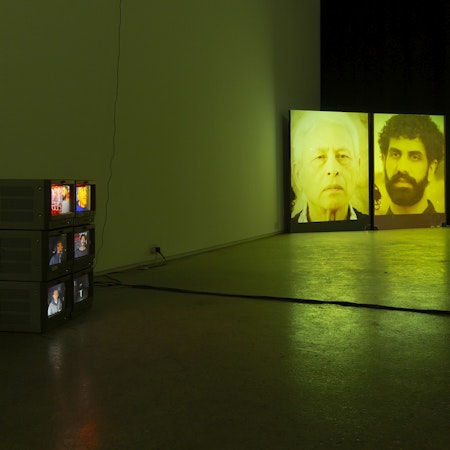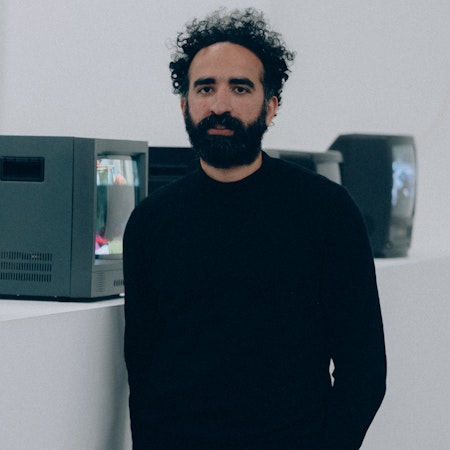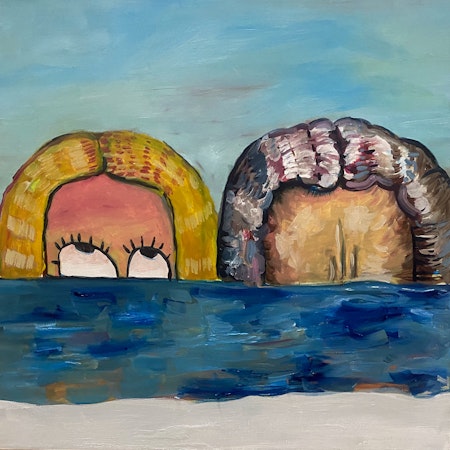You are writing to Maged Zaher and Youssef Chahine.
Wondering if it is possible to speak from an oscillating position where the I as an eye is a subject who shifts. Less static than the body of camera, akin more to the fluidity of film as a relation to pixels — as images might be the poem and as the poem might be our montage.
You remember it has been twelve years.
You see Youssef, the disastrous invention of monotheism, might have been the title of the chapter. And, I don’t believe in God, might be how each line of the poem begins; and if Superman might have been an Arab, it presupposes what we read as red. [1]
He is the you of his own poems.[2]
We talked about time and distance being calculated by bodies and the algorithm dissolving the division that a page gives to space. Oedipal parables in parallels, technology the new sovereign for States that are us. For Jessica last week, I cited her Michel Foucault’s wholesale slaughter[3] I paired it with end of financial year spreadsheets — profit confit.. The decline of the narrative, van Alphen says, is directly proportional to the rise of the archive.[4]
In a city under deconstruction,
there is longing in the streets.
Everyone is catching up with everyone.[5]
Yesterday, a good friend of ours remarked while sipping tea, “I’ve learnt in this country not to tell everyone everything” Fresh mint leaves with black tea, you sipped and she continued, “But, we grew up during war; speaking was how we survived.”
The email always arrives at its destination, the psychotic is possessed by words. When you read the novella On Confused Love and other catastrophes in little more than an hour, the picture of Marx, the economy of words, the space of pathos. I contacted you and we each describe the other and their writing as akin to architecture — a linguist’s mirror, shared foundations and knots of distance amongst a draught of desire — our punctuation is in the observations of class and coffee.
Cinema and stills appear as might a ghost conjured by the analogue in reference to the digital; indexing the other, indexing each other. Materiality woven in form by content. Nostalgia diverted by imprinting what is shared by the body through senses as seen in conversation with time — a history to haul. The inscription of images attenuated by a surplus of process where memory is sharpened by the process’s success.
Memory and drama. You and your political poetry interchange change with sex, intersect sex with change. Have you considered that the virtue of bodybuilding is that it is the spectacle of excess?[6] If the psychotic is possessed by words…
I am well placed in the documentary
Except that these lines aren’t my desires
The military trucks are intriguing,
in their daily search for intimacy.[7]
The loss of narrative sees the substantiation of individuals over categories.[8] The function of the bodybuilder is not to win; but to go through the motions which are expected of him.[9] And you said; this is Power? A glance, a glimpse caught as if thought the camera is gone. Colonial affairs, the disciplinary psyche of cultural taboos. The consummation equivocating impossibility for both revolution and transgressive love.[10]
During the workshop, it was remarked: “conflict is a form of intimacy”. Father and Son, the King and his subjects, God and their conistituents, the demigod and a public. The emblem of the body as a relation to the gender of the gaze. The emblems of democracy as the emblem of power, as the emblems of absurdity — America, Egypt the Third Reich and Marcel Broodthaers. The excess of eagles. To be punctured is punctuating.
Kim, I am listening. It's not my fault I was born a man. Come on, Zeus, take my hand.[11] I am reading.
Eduardo Lourenço says Portugal has an image problem.
Related to its past, the problem manifests in the perception of identity that the nation has of itself. Not because of a lack.
On the contrary, because it has it in excess.[12]
A man’s hand rises from beneath the scrum of special agents, gunshots and an oversized flag, bandages on ears as a uniform of solidarity and an unconfirmed near miss. A few weeks ago, I said to my father, surely this is elder abuse.
The film said, it has been twelve years.
The revolution will not be televised. It is languaged — somewhere between jurisprudence and apartheid. The bodies we make laws about. There is no king in imperialism, we are led by Fathers. Bless. They will not call you MZ, just like last time.
But,
If you follow the attached link,
Though,
The state will happily deliver its violence to your computer screen.[13]
This isn’t really a letter, is it? My analyst told me, this emptying out of interiority is to the benefit of exterior signs.[14] You have been walking through the park at dusk talking to Juliet about being calm in the space of fear, Simone Weil as Antigone and Superman as he.
You keep coming back to Paris, Dammi says, to find a different ending to your past.[15] The son whose Algerian father did not leave for London with his mother. The autobiographical and its relationship to the social — the wider the historical lens the less it centres the individual and the more it can critique.
You read that Youssef explores the history of Egypt's and his own, history that is. Identity formed through musical and comedy, political thrillers and rural dramas, historical epics, social protest films and documentaries. The emblem of life as a category of film. Youssef, you said, “it takes a lot of courage to do the autobiographical thing. It makes you vulnerable; it’s difficult to look into yourself and be very honest about it, because we also, sometimes, fall into the trap of accepting an image or creating an image of ourselves which is not real.” [16]
The categories of men who wish to make the desert bloom and engineers who plan our settlement on the moon.
The Return of the Prodigal Son is a painting by Rembrandt that hangs in the Hermitage and a 1976 film by Youssef Chahine. Historical narratives and the space between mercy and compassion, the corruption of a family, the compromise of love and the projection of a life split. The film locates us in time by footage of Gamal Abdel Nasser’s Funeral – the progressive social and anti-imperialist president of Egypt who died of a heart attack after the 1970 Arab League summit. Returning after 12 years and sometime spent in a Cairo prison, Ali the son of a local businessmen and bother to the tyrannical Tolba, whose oil pressing business supports the small town in which they live. The musical-cum-biblical melodrama is simultaneously as complex as it is simple — class and family, labour politics and a choir, and a the clown and his clowning offspring as the cinematic equivalent of a Greek chorus.
A surreal interlude halfway through the 124 minute film is what you have chosen to steal, searching for the equivalent of both the promise and despair of the desert. Do the pink cliffs of Heathcote emulate the sand dunes in the village somewhere between Cairo and Alexandia? The split screen of a paternal relation is in conversation with displacement, not only of place but in the power relation that is familial, social and economic.
If we ask a madman which one is mad,
He who wants to swim downstream,
Or he who wants to leave his footprint on the moon?
What do you think he’d say?
Neither of us managed to leave even a footprint in the desert
But Ibrahim isn’t holding a stick
There’s only a passport between him and the moon.[17]
[1] Joumana Haddad, Superman is an Arab: On God, Marriage, Macho Men and other disastrous inventions, The Westbourne Press, London, 2012.
[2] Susan M Schultz, A future introduction to the work of Maged Zaher, Monday, January 4, 2016, https://tinfisheditor.blogspot.com/2016/01/a-future-introduction-to-work-of-maged.html, accessed July 15, 2024.
[3] Michel Foucault, “Right of Death and Power Over Life”, The History of Sexuality, Vol. I, 1978, p.42
[4] Ernst van Alphen in Ana Catarina Pinho, “ALBUMS OF A DICTATORSHIP Photography archive, memory and counter narratives” in Photographies, Vol. 13, No. 1, 2020, p. 113
[5] Maged Zaher, “2: Cairo Poems (Mid July 2011 – End of September 2011)” from The Revolution Happened and You Didn’t Call Me in Opting Out: Early, New and Collected Poems 2000-2015, Chatwin Books, 2017, p.247
[6] Re-phrased from Roland Barthes, “The World of Wrestling” in Mythologies, p. 13
[7] Ibid, p, 245
[8] Riffing off Ernst van Alphen in Ana Catarina Pinho, “ALBUMS OF A DICTATORSHIP Photography archive, memory and counter narratives” in Photographies, Vol. 13, No. 1, 2020, p. 113
[9] Re-phrased Roland Barthes, p.14
[10] Youssef Chahine and Joseph Massad, “Art and Politics in the Cinema of Youssef Chahine” in Journal of Palestine Studies , Winter, 1999, Vol. 28, No. 2 (Winter, 1999), pp. 77-93
[11] Kim Gordon, “I’m a man”, The Collective, CBC, February 2024
[12] Ana Catarina Pinho, “ALBUMS OF A DICTATORSHIP Photography archive, memory and counter narratives” in Photographies, Vol. 13, No. 1, 2020, p. 113
[13] Maged Zaher, op.cit, p.265
[14] Roland Barthes, p.16
[15] Yann Derrange, Dammi, 19 minutes, 2023
[16] Youssef Chahine and Joseph Massad, “Art and Politics in the Cinema of Youssef Chahine” in Journal of Palestine Studies , Winter, 1999, Vol. 28, No. 2 (Winter, 1999), pp. 77-93
[17] Youssef Chahine, The Return of the Prodigal Son ( عودة الابن الضال,), Misr International Films, 124 minutes,1976. The Palestine Space Institute states that they are a pioneering and visionary think tank that stands at the forefront of space ethics and the responsible use of outer space, their byline reads: Advocating for Peace, From Palestine to the Stars, https://www.palestinespace.org, accessed July 23, 2024.


